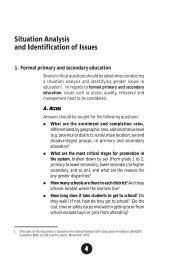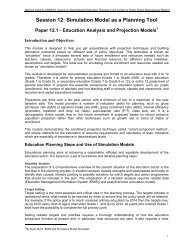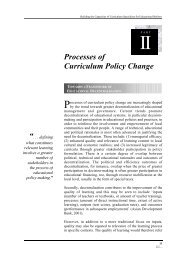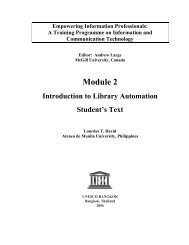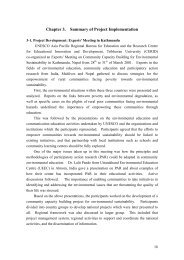Educational Finance in Thailand - UNESCO Bangkok
Educational Finance in Thailand - UNESCO Bangkok
Educational Finance in Thailand - UNESCO Bangkok
Create successful ePaper yourself
Turn your PDF publications into a flip-book with our unique Google optimized e-Paper software.
5.12 Incentives for cost conta<strong>in</strong>ment, reduction of the <strong>in</strong>centive towards over-utilization,<br />
and so on, should also be built <strong>in</strong>to the system, through for example, cost-shar<strong>in</strong>g schemes<br />
for services chosen beyond the basic level. However <strong>in</strong> design<strong>in</strong>g policies, one also needs<br />
an understand<strong>in</strong>g of what functions governments have assumed <strong>in</strong> the past, and why. An<br />
understand<strong>in</strong>g of the behavior of the state is also relevant <strong>in</strong> determ<strong>in</strong><strong>in</strong>g the desirability of<br />
government action. In addition, the appropriate form of <strong>in</strong>tervention also depends on the<br />
<strong>in</strong>struments available to the government, such as what taxes and expenditure policies are<br />
feasible, what k<strong>in</strong>ds of <strong>in</strong>formation is available to the government, what <strong>in</strong>centives there<br />
are for <strong>in</strong>dividuals to reveal <strong>in</strong>formation (such as about their endowments or their<br />
preferences for public goods), and the constra<strong>in</strong>ts on the government's actions. In addition,<br />
the <strong>in</strong>centives of the government itself have to be taken <strong>in</strong>to account, such as whether<br />
there is a tendency to favor certa<strong>in</strong> segments of the population, and tax some groups of<br />
the population more heavily to subsidize others <strong>in</strong>appropriately.<br />
5.13 Public provision, the nature and type of f<strong>in</strong>anc<strong>in</strong>g schemes, the level of fees, all<br />
affect the behavior of producers and consumers and <strong>in</strong>fluence the distribution of wealth<br />
and <strong>in</strong>come <strong>in</strong> the economy. If the beneficiaries are not the truly needy, then public<br />
provision can be distortionary. Whether a disproportionately heavy burden is placed on<br />
the poor depends on how spend<strong>in</strong>g is allocated and revenue raised. If wealth taxes such<br />
as property taxes, capital ga<strong>in</strong>s taxes, and <strong>in</strong>heritance taxes are low or non-existent, then<br />
public provision could have regressive elements. All these considerations have to be dealt<br />
with, if long-run benefits are to be reaped, and susta<strong>in</strong>able development accomplished.<br />
5.14 Decentralization has long been supported as a means to achieve adm<strong>in</strong>istrative<br />
reform and improvement <strong>in</strong> quality. There are certa<strong>in</strong>ly good a priori grounds for<br />
th<strong>in</strong>k<strong>in</strong>g highly centralized systems would underperform: <strong>in</strong>centives are distorted,<br />
logistics are a nightmare, and dis<strong>in</strong>terest <strong>in</strong> performance at the periphery is pervasive<br />
because of the lack of everyth<strong>in</strong>g, notably <strong>in</strong>puts. So decentralization is likely to be a<br />
good idea. But with all good ideas, it is easier to th<strong>in</strong>k of them <strong>in</strong> the abstract than to<br />
translate them <strong>in</strong>to workable game plans. Just how is decentralization supposed to work?<br />
5.15 Decentralization by itself is no panacea. Several important considerations need to be<br />
borne <strong>in</strong> m<strong>in</strong>d. It is not a valuable public policy simply because exist<strong>in</strong>g public systems<br />
are <strong>in</strong>adequate. Decentralization of services, management, and service delivery <strong>in</strong>centives<br />
may be desirable, but what is difficult is the translation of ideas <strong>in</strong>to workable solutions.<br />
What decentralization should accomplish are the follow<strong>in</strong>g: improvement <strong>in</strong> the delivery<br />
of services, efficiency, better performance of personnel through improved <strong>in</strong>centives, and<br />
elim<strong>in</strong>ation of waste and <strong>in</strong>efficiency through too highly structured adm<strong>in</strong>istrative<br />
systems <strong>in</strong> the center. It should not be thought of as simply giv<strong>in</strong>g more authority to rural<br />
areas. It is not a regional or geographic concept, but a concept based on efficiency,<br />
performance, and satisfaction. Thus, decentralization planners will want to reth<strong>in</strong>k not<br />
only the location of schools and facilities, but the very essence of these <strong>in</strong>stitutions: what<br />
should the schools be like -- <strong>in</strong>deed should the government run and operate any schools?<br />
How should these facilities be staffed? How will we ensure access for the poor? How<br />
can budgetary/f<strong>in</strong>ancial resources for education be ma<strong>in</strong>ta<strong>in</strong>ed <strong>in</strong> a devoluted system?<br />
5.16 There may be also be resistance to the redistribution of political power and<br />
empowerment of disadvantaged groups, and strategies to deal with this would have to be<br />
thought out. F<strong>in</strong>er details also have to be considered. For example, should everyth<strong>in</strong>g<br />
from personnel, procurement, to budgetary decisions be devoluted from the center? Are<br />
180



